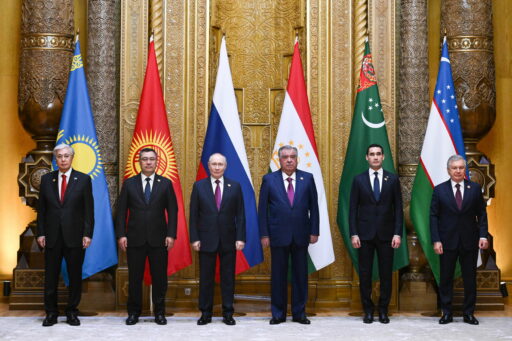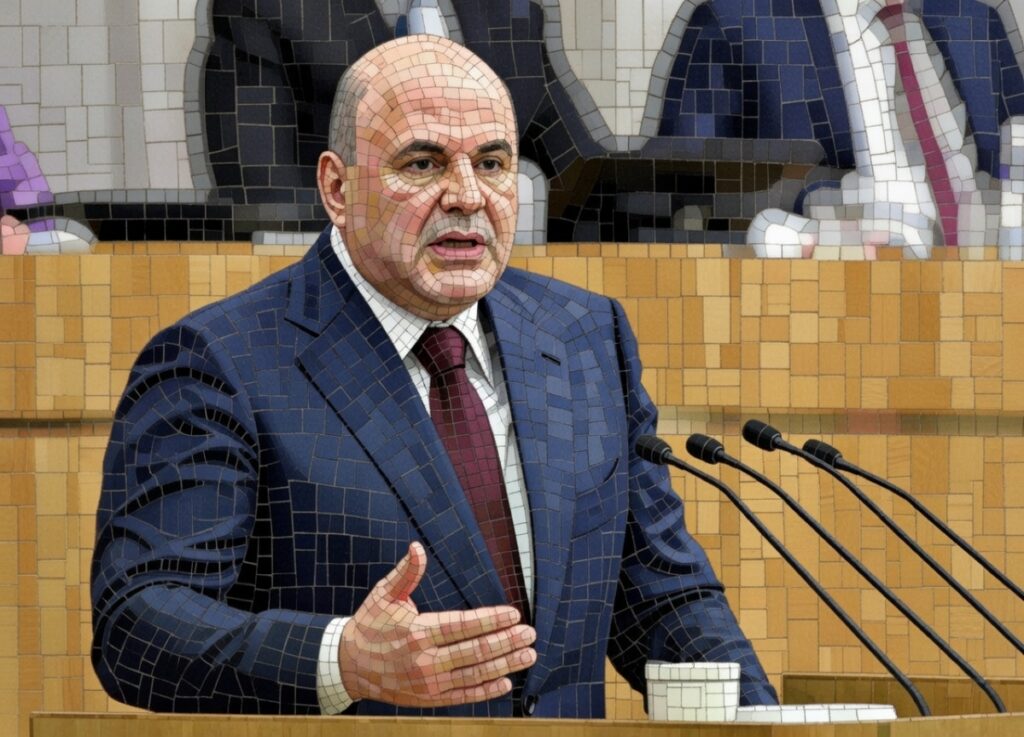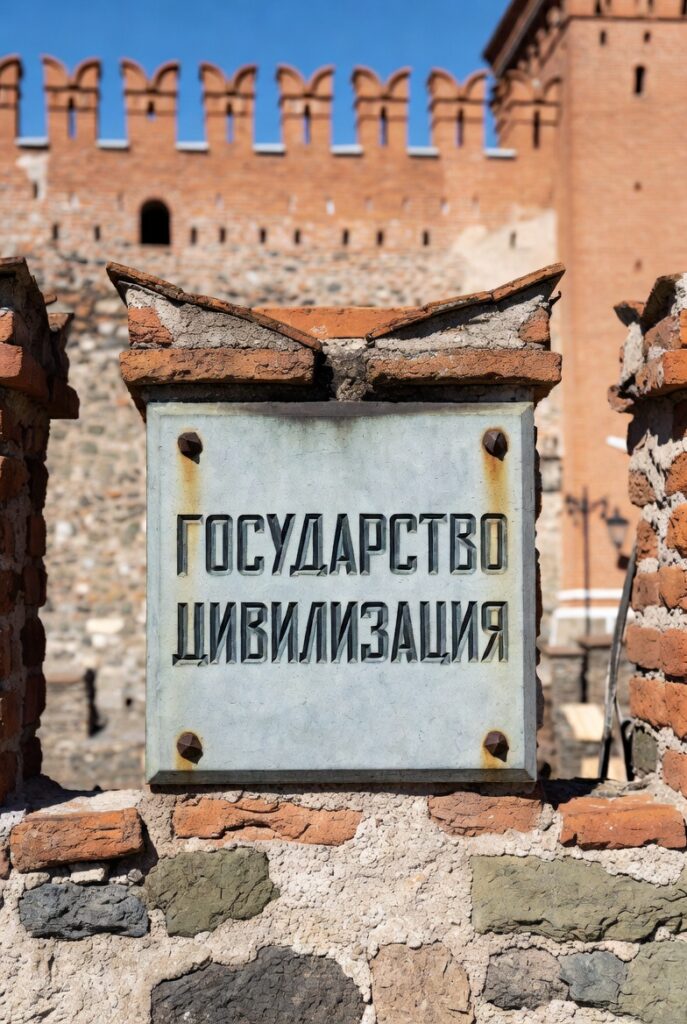Putin attended the «Journey into the World of AI» conference organized by Sberbank and its head German Gref. Artificial intelligence and the high-tech sector is one of the Russian president’s favorite topics. Gref is aware of this and constantly invites Putin to visit Sberbank’s booths at various events. There the head of the country is greeted by robots, interactive screens, voice assistants, and he clearly likes this high-tech vibe. Putin smiles, communicates with AI and, of course, lavishes the head of Sberbank with praise. The political bloc of the presidential administration used these templates of flashy hi-tech in the design of the Exhibition and Forum «Rossiya», where guests were greeted by neuro-animals, huge screens, and prototype cars. This magical world fascinates Putin, perhaps because it seems to him the best alternative to the real world. At the same time, it is the beautiful interface that attracts the president, not the content. Dmitry Peskov, the Russian president’s press secretary, has repeatedly said that Putin hardly uses modern technology and the Internet, i.e. he is really not very tech-savvy. Putin’s preferences in the world of high-tech (robots or voice assistants that answer questions and queries, beautiful screens) are very similar to the world of science fiction of the 1960s and 1970s. In it, robots become obedient servants to people, helping them with every task and chore, making their life extremely easy and comfortable. This is a vulgar and even somewhat childish view of the high-tech world, but Putin has no other view. German Gref skillfully exploits this passion of his, showing the president beautiful interfaces and the most basic and straightforward applications of AI, for example, categorizing questions by topic for his «Direct Line with Vladimir Putin» press conference.
Putin’s speech at the conference also demonstrates this low-brow view. He sees artificial intelligence as a magical «little helper» that will fundamentally change human life. Since this is a relatively new field, the Russian president seems to think that Russia will be able to take a leading position in it, after all the country has been so successful in developing electronic services, from the Russian government’s ‘Gosuslugi’ digital platform to banking applications and delivery services. In reality, this interface has little to do with AI, but the president’s entourage is ready to support his delusion. Putin wants to see «sovereign AI», not realizing that neural networks are trained on different language models and that the corpus of Russian texts is very limited. But Russian managers and bureaucrats realize that it is not worth trying to dissuade the Russian leader. The Russian president’s illusions are understandable: the war has plunged the country into crisis, sanctions are hitting traditional industries and the economy is deteriorating. In the world of someone with a long-standing penchant for science fiction, AI is a total game changer that can magically help overcome this crisis. Russia will simply come and occupy the niche that, in Putin’s view, no one has really occupied before and will help the country overcome all its difficulties. This magical thinking also manifests itself in the way the Russian elites view the election of Donald Trump. They expect him to come and solve all of Russia’s problems: to live with the sanctions and to make peace.
Russia does have successful examples of using AI for service purposes, but this is only a small part of its capabilities. But even with all these possibilities, artificial intelligence has not yet become the magic wand in the hands of humanity that Putin wants it to be. At the same time, because Putin’s knowledge of this technology is so shallow and so fragmented, influential people in his inner circle will continue to sustain his illusion, and thus the favor of the Russian leader, thanks to the surface of its knowledge.
Lobbying instead of human rights advocacy
Vladimir Putin met with the Presidential Council for the Development of Civil Society and Human Rights. For a long time, real human rights defenders were members of the Council: for example, the head of the Moscow Helsinki Group, Lyudmila Alekseeva, the head of the Agora Association, Pavel Chikov, Valery Borshchev. Other members of the Council included journalists Leonid Parfenov and the late Nikolay Svanidze, the head of the Golos association Liliya Shibanova and political scientist Ekaterina Shulmann. Now many of the former Council members, such as Shulmann and Chikov, have been labeled foreign agents, and the Golos association has been stigmatized as «an undesirable organization». In the 2010s, the Council proposed the release of the accused in the Bolotnaya Square case and criticized the foreign agents law. Today human rights activists have been replaced by pro-government journalists and employees of pro-Kremlin organizations. The Council is headed by Valery Fadeyev, editor-in-chief of the Expert holding. It includes Sergey Chernogayev, head of the The Federation of Independent Trade Unions of Russia (FNPR), Sergey Karaganov, a political scientist who regularly suggests that the Kremlin use nuclear weapons; and Alexander Kots, a military reporter. They certainly won’t ask the president uncomfortable questions, make suggestions that might make him uneasy, or talk about human rights issues that he doesn’t understand very well.
The last meeting of the Council only confirmed this. In his speech, Putin outlined his own interpretation of ‘human rights’. In Putin’s brief description, human rights advocacy means helping citizens solve their social problems. The Russian leader praised the Presidential Council for the Development of Civil Society and Human Rights for helping participants in the war with Ukraine and residents of the newly annexed territories. The president then listed the areas in which he thought human rights defenders and activists should work. These include providing access to healthcare services and education, as well as tackling the problems of teachers and doctors themselves.
«We’ve been talking about this a lot lately — about doctors and teachers being overburdened with different bureaucratic reports they need to compile — we’ve been talking about it for a long time, we’ve been raising this issue all the time. I hope something is changing for the better — probably not much yet. I hope that you, the persistent people that you are, will be able to help achieve visible results in this regards,» Putin told the members of the Council.
For some reason, the president also included «digitalisation» among the Council’s areas of responsibility and interest, saying once again that Russia had outpaced most of the world in this area. Council members responded in kind, touching only on issues that did not cause the president any discomfort. Valery Fadeyev complained to Putin that schoolchildren do not study geography, history and literature well, describing these subjects as «values-shaping disciplines that help form the cultural code and civilisational identity of young people.»
«Geography question: „Where does the Volga river flow into?“ — Among young people aged 18−24, only 18% know that the Volga flows into the Caspian Sea. Among the older generation of those who studied in Soviet schools, not everyone knows the correct answer either, but at least some 60−70% do. Another question: „What does the word ‘Kuzbass’ mean?“ Among young people, only 18 per cent knew the correct answer,» Fadeyev complained, citing the results of a VTsIOM survey commissioned by the Council.
The chairman of the Council suggested that the admission of applicants to universities should be linked not only to the results of the Unified State Exam, but also to the «average GPA» in these «value-building» disciplines. Valery Fadeyev also supported the State Duma bill that bans migrant children who do not know Russian from attending school, but proposed the creation of integration and language-learning centers for such children. This proposal was clearly made at the behest of officials in the domestic political bloc of the presidential administration who are beginning to think about how to reduce anti-immigrant sentiment among Russians. The Kremlin and the government understood that the economy could not do without the labor of these migrants. However, for a long time the authorities used the anti-immigrant discourse to distract Russians from their problems and boost their own ratings. Putin was happy to listen to Fadeyev and agreed with his ideas. Other speeches — on aid for war veterans, human rights violations in the West, medical care for the homeless — also fit in well with Putin’s vision of what human right advocacy is. Members of the Council did not bother the president with talk of repression in the country.
But even talk of social rights, which Putin is said to be very interested in, remains just that: empty talk. The Russian budget is cutting spending on social sectors (education and health) that he rhetorically claims to care so much about. The state needs money for the war. None of the members of the Council raised this issue or even mentioned the cutbacks in social spending. In fact, in Putin’s view, ‘social welfare’ itself seems to mean the quasi-ideological indoctrination of schoolchildren and students in the interests of the state. The Council, which was supposed to help citizens defend themselves against state pressure, has turned into a body that serves the power vertical and Putin personally, offering him «solutions» in various spheres. The work of the Council has nothing to do with real human rights advocacy. It is actively used and exploited by various lobby groups and state agencies, such as the political bloc of the presidential administration. Thanks to its meetings with Putin, the Council has become a lobbying platform and is likely to use this status to offer services to influential groups and clans.
Temporary victory at the municipal level
The State Duma has postponed until next year the consideration of a bill that would abolish the entire lower tier of local self-government, i.e. rural and urban municipalities with the power to manage local affairs through deputy councils and local administrations, while expanding the remit of regional governors, who are appointed by Moscow. Several thousand municipalities are about to be abolished once the bill comes into force. Authorities in several Russian regions are already implementing such changes. In the Moscow region these reforms began several years ago, and today there are no lower-tier municipalities left in the region. For the time being, however, the decision to abolish them must be taken by the deputy councils of rural/urban settlements themselves, which often leads to protests from deputies and residents. The administrations and councils of small towns and villages remain the tier of the government closest to the local inhabitants and most attuned to their concerns, and people do not want to lose all that. Abolishing these lower-tier municipalities through a federal law would make it possible to disregard the opinion of citizens and their local representatives. However, the initiative has been rejected by the leaders of the large national republics: Rustam Minnikhanov (Tatarstan) and Radiy Khabirov (Bashkortostan). Both are representatives of the elites of their regions, and the posts of heads of municipalities and deputies, even at the level of settlements, are important to local clans. From the look of it, the center had to meet the republics halfway and make a ritual gesture of postponing the introduction of the initiative. But it is unlikely that the Kremlin will give up on destroying the power of municipalities altogether and erasing this level of local government, since this is exactly what the reform was intended to achieve. It will be pushed through no matter what, but perhaps with some ritual slack cut for the national regions.










